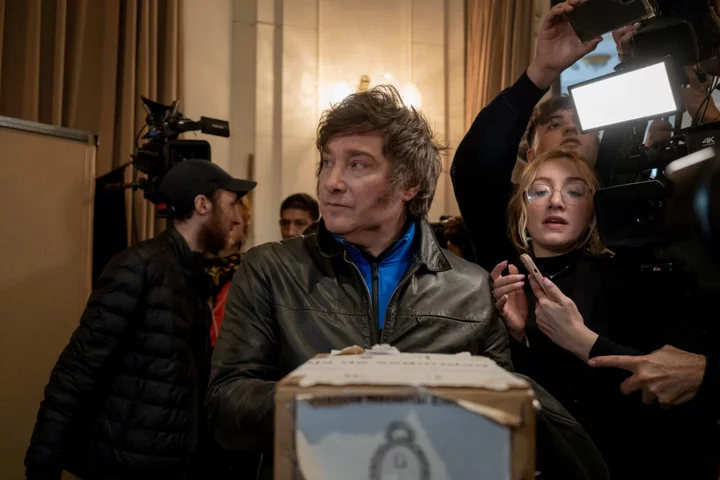Follow our live blog and see the live results as election data come in.
Argentina’s outsider congressman Javier Milei is leading a crucial primary vote with a stronger-than-expected performance that’s set to upend the inflation-ravaged country’s October presidential race.
With 77% of ballots counted, the congressman often compared to Donald Trump was the most voted individual candidate with 31.2%. He was even ahead of the probusiness coalition led by Patricia Bullrich — who together with defeated hopeful Horacio Rodriguez Larreta garnered 27.9% of votes — and dwarfed the ruling Peronist bloc of Economy Minister Sergio Massa, with 26.5%.
The result is a clear rejection to Argentina’s political establishment after years of economic hardship and runaway inflation. Argentine assets are likely to sell off on Monday as investors fear that Milei’s proposals, including the dollarization of the economy, would trigger financial mayhem. Lack of congressional support could also be an obstacle for him to pass the tough legislative reforms needed to get Argentina’s economy back on track, according to political analysts.
“Markets were expecting a clear outperformance by the opposition bloc and were somewhat complacent about Milei,” said Patrick Esteruelas, head of research at Emso Asset Management. “This will prolong the uncertainty and we may see a knee jerk selloff.”
Milei, who received the endorsement of Brazil’s former President Jair Bolsonaro before the vote, also stands to shake regional politics. An eventual win by the libertarian candidate would clash with the leftist leaders currently governing Brazil, Mexico, Colombia and Chile.
“Politicians are not the solution, they’re the problem,” Milei said in fiery speech after preliminary results of the vote were published.
The primary election, designed to allow Argentines to choose the candidates who will compete in the Oct. 22 general election, plays the role of a trusted barometer of public sentiment in a country with a long history of unreliable opinion polls. Four years ago, local markets had a meltdown when the primary results caught investors off guard.
Whoever wins Argentina’s highest office later this year will have to quickly put in motion a plan to cut government spending and stave off hyperinflation while addressing growing concerns about public security and a looming recession.
The challenge is immense. Consumer prices are rising by more than 115% a year as the central bank prints pesos to finance the social programs and subsidies that have so far ensured the subsistence of millions of Argentines. But that same strategy is at the root of the inflation and currency crises that are tearing the country’s social fabric.
Read More: Argentina Voters Are on a Collision Course With Hyperinflation
More importantly, this year’s election will gauge Argentines’ appetite for the tough economic reforms needed to pull South America’s second-largest economy from the brink of a precipice. The country didn’t get here overnight, but after decades of failed policies, debt defaults and economic recessions — at least 15 of them since the 1950s.
Support from the International Monetary Fund will be crucial in any recovery plan for Argentina, which received a record $44 billion bailout from the IMF in 2018, during Mauricio Macri’s term. The program has been renegotiated under President Alberto Fernandez, more recently in a deal brokered by Massa last month.
The economy minister managed to get just enough money — as much as $10.8 billion by year-end — to repay the Fund and keep the economy going without the need for drastic measures until a new president takes over. Yet investors consider a significant peso devaluation — not smaller than 20% — as inevitable. The question is whether the government will be able and willing to delay it until a new president takes office in December.
Argentina may need to wait three more months to know who its future president will be. An outright victory in October requires the top candidate to receive 45% of valid votes, or 40% of them with a 10 percentage point difference from the runner-up. If neither scenario materializes, there will be a runoff vote on Nov. 19.
Burn the Central Bank
Milei’s recipe to fix Argentina’s economy sounds as bombastic as his style. He has proposed replacing the struggling national currency with the dollar and said he would “burn down” the central bank for mismanaging the economy.
The economist-turned-politician rose to fame in recent years for his combative profile in television programs and social networks. With an eccentric look and an energetic tone, he won followers by pushing against state interventionism. Some of his controversial opinions include the defense of gun ownership, his stance against abortion and the sale of human organs.
Read More: Argentina’s 100% Inflation Opens the Way to a Presidential Upset
Milei’s election strategy is simple.
“If we get to a runoff, we’ll win,” he said in an interview with Bloomberg News in March. After the primary election results, he now says he can win the presidency in the first round of voting.
--With assistance from Giovanna Bellotti Azevedo.
(Updates vote count, adds comments from economist, Milei starting in third paragraph.)
Author: Manuela Tobias, Scott Squires and Ignacio Olivera Doll

